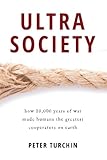Ultrasociety: how 10,000 years of war made humans the greatest cooperators of earth / Peter Turchin
Por: Turchin, Peter [autor].
Tipo de material: Libro
impreso(a)
Editor: Chaplin, Connecticut, United States: Beresta Books, c2016Descripción: 266 páginas ; 23 centímetros.ISBN: 0996139516; 9780996139519.Tema(s): Historiografía
Libro
impreso(a)
Editor: Chaplin, Connecticut, United States: Beresta Books, c2016Descripción: 266 páginas ; 23 centímetros.ISBN: 0996139516; 9780996139519.Tema(s): Historiografía| Tipo de ítem | Biblioteca actual | Colección | Signatura | Estado | Fecha de vencimiento | Código de barras |
|---|---|---|---|---|---|---|
| Libros |
Biblioteca Campeche
Texto en la configuración de la biblioteca Campeche |
Acervo General | 907.2 T8 | Disponible | ECO040007077 |
Chapter 1. The puzzle of ultrasociality.. From Göbekli Tepe to the International Space Station.. Chapter 2. Destructive creation.. How cultural evolution creates large, peaceful, and wealthy ultrasocieties.. Chapter 3. The cooperator's dilema.. Selfish genes, 'greed is good' and the Enron fiasco.. Chapter 4. Cooperate to compete.. What team sports teach us about cooperation.. Chapter 5. 'God made men, but Sam Colt made them equal'.. How early humans suppressed alpha males.. Chapter 6. The human ways of war.. War as a force of destructive creation.. Chapter 7. The rise of god-kings.. The alpha male strikes back.. Chapter 8. The iron law of oligarchy.. Why power inevitably corrupts.. Chapter 9. The pivot of history.. The spiritual awakening of the Axial Age.. Chapter 10. Zigzags of human evolution, and the science of history.. Acknowledgments.. Notes
Cooperation is powerful. There aren't many highly cooperative species-but they nearly cover the planet. Ants alone account for a quarter of all animal matter. Yet the human capacity to work together leaves every other species standing. We organize ourselves into communities of hundreds of millions of individuals, inhabit every continent, and send people into space. Human beings are nature's greatest team players. And the truly astounding thing is, we only started our steep climb to the top of the rankings-overtaking wasps, bees, termites and ants-in the last 10,000 years. Genetic evolution can't explain this anomaly. Something else is going on. How did we become the ultra social animal? In his latest book, the evolutionary scientist Peter Turchin (War and Peace and War) solves the puzzle using some astonishing results in the new science of Cultural Evolution. The story of humanity, from the first scattered bands of Homo sapiens right through to the greatest empires in history, turns out to be driven by a remorseless logic. Our apparently miraculous powers of cooperation were forged in the fires of war. Only conflict, escalating in scale and severity, can explain the extraordinary shifts in human society-and society is the greatest military technology of all. Seen through the eyes of Cultural Evolution, human history reveals a strange, paradoxical pattern. Early humans were much more egalitarian than other primates, ruthlessly eliminating any upstart who wanted to become alpha male. eng
But if human nature favors equality, how did the blood-soaked god kings of antiquity ever manage to claim their thrones? And how, over the course of thousands of years, did they vanish from the earth, swept away by a reborn spirit of human equality? Why is the story of human justice a chronicle of millennia-long reversals? Once again, the science points to just one explanation: war created the terrible majesty of kingship, and war obliterated it. Is endless war, then, our fate? Or might society one day evolve beyond it? There's only one way to answer that question. Follow Turchin on an epic journey through time, and discover something that generations of historians thought impossible: the hidden laws of history itself. eng
